
Frontiers in Insect Science
Scope & Guideline
Championing Open Access for Insect Research
Introduction
Aims and Scopes
- Insect Physiology and Molecular Biology:
Researching the physiological processes and molecular mechanisms that govern insect development, behavior, and adaptation. This includes studies on gene expression, hormonal regulation, and the role of RNA and proteins in insect life cycles. - Ecology and Behavior of Insects:
Examining the ecological roles of insects, including their interactions with plants, other animals, and their environments. This area includes behavioral studies, population dynamics, and the impact of environmental changes on insect communities. - Insect Pest Management and Control:
Focusing on integrated pest management strategies, including the use of biological control agents, chemical controls, and the development of genetically modified organisms for pest control. Research in this area is crucial for sustainable agriculture and minimizing environmental impact. - Insect Conservation and Biodiversity:
Addressing the conservation of insect species and their habitats, including studies on invasive species, ecosystem services provided by insects, and the effects of climate change on insect populations. - Insect-Plant Interactions:
Investigating the complex relationships between insects and plants, including feeding behaviors, plant defenses, and the ecological consequences of these interactions.
Trending and Emerging
- RNA Interference and Genetic Manipulation:
The use of RNA interference (RNAi) techniques and genetic manipulation in pest control is gaining traction, highlighting innovative approaches to managing pest populations through genetic biocontrol. - Impact of Climate Change on Insect Dynamics:
Research exploring the effects of climate change on insect behavior, physiology, and ecology is becoming increasingly prominent, reflecting the urgent need to understand how global changes impact insect populations and their roles in ecosystems. - Microbiome Research in Insects:
The investigation of gut microbiomes and their influence on insect health, nutrition, and behavior is an emerging area of interest, as it offers potential insights into insect resilience and pest management. - Behavioral Ecology and Social Insects:
Studies focusing on the behavioral ecology of social insects, particularly in the context of environmental pressures and social dynamics, are becoming more prevalent, emphasizing the complexity of insect societies. - Insect Responses to Environmental Stressors:
There is a growing focus on how insects respond to various environmental stressors, including chemical pollutants and habitat changes, which is critical for understanding their adaptability and resilience.
Declining or Waning
- Traditional Insect Taxonomy:
There has been a noticeable decrease in studies focused solely on traditional taxonomy and classification. This shift may be due to the increasing integration of molecular techniques that provide more detailed insights into insect phylogeny and biodiversity. - Chemical Ecology of Insecticides:
Research specifically centered on the chemical ecology of insecticides appears to be waning, possibly as a result of the growing emphasis on integrated pest management and biological control strategies. - Insect Physiology under Controlled Conditions:
While physiological studies remain important, there seems to be a reduction in research focused exclusively on laboratory-based physiological experiments. This may be due to a trend towards more ecologically relevant field studies that assess insect responses in natural environments.
Similar Journals
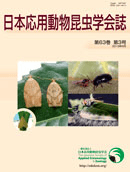
JAPANESE JOURNAL OF APPLIED ENTOMOLOGY AND ZOOLOGY
Unveiling the Secrets of Insect Behavior and EcologyJapanese Journal of Applied Entomology and Zoology is a premier publication in the field of Insect Science, offering a platform for researchers and practitioners to share their findings on applied entomology and zoology. Established in 1957 and published by the Japan Society of Applied Entomology and Zoology, this journal aims to foster the understanding of insect-related studies that impact agriculture, ecology, and biodiversity. With an ISSN of 0021-4914 and E-ISSN of 1347-6068, it serves as a crucial resource for both academics and industry professionals. While the journal currently resides in the Q4 category of the Scopus ranking for Insect Science with a percentile of 11th, it plays a significant role in providing valuable insights into insect behavior, systematics, and their ecological roles. Readers can benefit from its published research to drive innovations and solutions in pest management and conservation practices. As the journal continues to evolve, it reinforces its commitment to disseminating critical research that supports sustainable practices in entomology and zoology through its convergence extending to the year 2024.
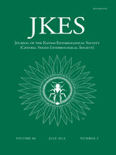
JOURNAL OF THE KANSAS ENTOMOLOGICAL SOCIETY
Fostering a Community of Entomological ExcellenceJOURNAL OF THE KANSAS ENTOMOLOGICAL SOCIETY, published by the Kansas Entomological Society, serves as a vital platform dedicated to the field of entomology and insect science. With an ISSN of 0022-8567 and an E-ISSN of 1937-2353, this journal has established itself since its inception in 1994, continuing to contribute valuable research up to 2024. Despite its current Q4 categorization in the 2023 Insect Science rankings, it ranks 106 out of 181 in Scopus, representing a significant opportunity for researchers to disseminate their findings in a supportive and engaged community. Although it is not an open-access journal, its commitment to rigorous peer review and relevance in agricultural and biological sciences makes it an essential resource for professionals, scholars, and students alike. The journal's focus on local and regional entomological issues often addresses broader ecological impacts, showcasing the importance of insects in environmental health and agriculture. We invite you to explore the rich tapestry of findings and discussions within this esteemed publication.
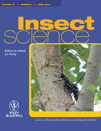
Insect Science
Exploring the intricate roles of insects in agriculture and ecology.Insect Science, published by WILEY, stands as a prestigious journal in the realms of Agronomy, Biochemistry, Genetics, and Insect Ecology. The journal, with ISSN 1672-9609 and E-ISSN 1744-7917, has firmly established itself as a significant resource for researchers and professionals seeking to explore the intricate dynamics of insects and their crucial roles in ecosystems. With a remarkable impact factor placing it in the Q1 quartile across multiple categories, including Ecology and Evolution and Agronomy and Crop Science, Insect Science ranks impressively at #8 out of 181 in the realm of Insect Science on Scopus, showcasing its influence and relevance in the field. Spanning its coverage from 1994 to 2024, this journal invites contributions that advance our understanding of insect biology, behavior, and their interactions within agricultural contexts. The commitment to high-quality research and its role in fostering interdisciplinary dialogue make Insect Science an essential platform for scholars and practitioners at the forefront of insect-related studies.
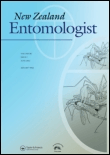
NEW ZEALAND ENTOMOLOGIST
Unveiling the Secrets of Insect Biology and EcologyNEW ZEALAND ENTOMOLOGIST, published by Taylor & Francis Ltd, is a distinguished journal in the field of Insect Science, featuring a rich history dating back to its initial publication in 1952. As a platform for sharing innovative research and critical insights, this journal serves as a vital resource for entomologists and scientists interested in the diverse aspects of insect biology, ecology, and behavior. Although it currently holds a Q4 category in its discipline with Scopus ranking it at the 163rd out of 181 journals, the NEW ZEALAND ENTOMOLOGIST continues to uphold high-quality standards of peer-reviewed articles that contribute significantly to the understanding of insects, particularly within the unique ecosystems of New Zealand. Researchers and professionals are encouraged to submit their findings to enhance the journal's growing repository of knowledge, while students will find a wealth of information to aid their studies and foster their interest in entomological research.
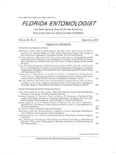
FLORIDA ENTOMOLOGIST
Connecting Minds in the World of Insect BiologyFLORIDA ENTOMOLOGIST is a prestigious peer-reviewed journal dedicated to the advancement of entomological sciences, published by Walter de Gruyter GmbH. Since its transition to open access in 1994, the journal has become a vital resource for researchers, students, and professionals in the fields of Insect Science and Ecology, Evolution, Behavior, and Systematics. With an impact factor ranking high in its category—Q2 in Insect Science and Q3 in Ecology, Evolution, Behavior and Systematics—the journal showcases significant findings and contributions that shape our understanding of insect biology and its implications for ecological systems. The journal is indexed in Scopus, further establishing its relevance, with current rankings reflecting its competitive standing within Agricultural and Biological Sciences. Published continuously since 1982, FLORIDA ENTOMOLOGIST not only facilitates the dissemination of knowledge among entomologists but also encourages interdisciplinary collaboration, making it an essential publication for anyone invested in the scientific study of insects.
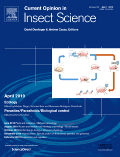
Current Opinion in Insect Science
Unraveling the Mysteries of Insect LifeCurrent Opinion in Insect Science is a leading academic journal published by ELSEVIER, dedicated to advancing understanding in the field of insect science. With an impressive impact factor reflected in its top quartile rankings (Q1) within both Ecology, Evolution, Behavior and Systematics and Insect Science, the journal holds a prominent position, ranking 3rd out of 181 journals in Insect Science and 35th out of 721 in Ecology-related fields according to Scopus for 2023. Since its inception in 2014, the journal has provided a dynamic platform for researchers, professionals, and students to explore and share cutting-edge developments and insights, targeting crucial topics in insect biology, ecology, and systematics. Although there are no open access options available, Current Opinion in Insect Science remains an essential resource for those looking to stay at the forefront of their research or academic interests.

REVISTA DE LA SOCIEDAD ENTOMOLOGICA ARGENTINA
Connecting Minds in Entomology and EcologyREVISTA DE LA SOCIEDAD ENTOMOLOGICA ARGENTINA is an esteemed open-access journal dedicated to the field of entomology, published by the SOCIEDAD ENTOMOLOGICA ARGENTINA. Since its transition to open access in 2013, the journal has sought to promote research in insect science, ecology, and related disciplines, facilitating global dissemination of knowledge and encouraging collaborative studies across borders. Located in the vibrant scientific landscape of La Plata, Argentina, the journal is indexed in Scopus and categorized in the fourth quartile of ecology and insect science, reflecting its commitment to enhancing the discourse within these critical fields. Aiming to bridge the gap between researchers, students, and professionals, REVISTA DE LA SOCIEDAD ENTOMOLOGICA ARGENTINA serves as a platform for innovative research, reviews, and reports on ecological interactions, behavior, and systematic entomology, ultimately driving forward our understanding of insect biodiversity and its broader environmental impacts.
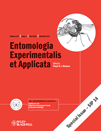
ENTOMOLOGIA EXPERIMENTALIS ET APPLICATA
Connecting researchers with the latest in entomological advancements.ENTOMOLOGIA EXPERIMENTALIS ET APPLICATA is a premier journal dedicated to advancing the understanding of insect science through innovative research and thorough experimental methodologies. Published by Wiley, this esteemed journal has been at the forefront of entomology since its inception in 1958, with its latest convergence extending until 2024. With a commendable Impact Factor and categorically positioned in the Q2 quartile across both Ecology, Evolution, Behavior and Systematics and Insect Science fields, it plays a pivotal role in the dissemination of critical findings. The journal is indexed in Scopus, ranking 43rd out of 181 in Insect Science, showcasing its relevance and stature within the academic community, while maintaining a robust visibility among scholars. Given its rigorous peer-review process and a commitment to quality and innovation, ENTOMOLOGIA EXPERIMENTALIS ET APPLICATA serves as a vital resource for researchers, professionals, and students aiming to deepen their insights into entomological research.

Insects
Fostering Collaboration in Entomological DiscoveriesInsects is a prominent open-access journal published by MDPI, dedicated to advancing research in the vibrant field of insect science. Since its inception in 2011, this journal has become a vital resource for academics and professionals alike, also ranked in the prestigious Q1 category within the Insect Science field by Scopus, achieving a remarkable rank of 26 out of 181 journals. With an ongoing convergence period from 2010 to 2024, Insects provides comprehensive coverage of various aspects of entomology, including but not limited to ecology, behavior, physiology, and applied entomology. Based in Switzerland, the journal promotes an open-access model, ensuring that vital research is readily available to researchers, practitioners, and students globally. This journal not only facilitates the dissemination of groundbreaking entomological research but also fosters collaboration and interdisciplinary dialogue in the field.
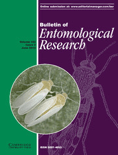
BULLETIN OF ENTOMOLOGICAL RESEARCH
Connecting Agriculture and Insect Science for Global ImpactBULLETIN OF ENTOMOLOGICAL RESEARCH, published by Cambridge University Press, is a prestigious journal that has been at the forefront of entomological research since its inception in 1910. With an impressive track record extending through to 2024, this journal serves as a vital platform for advancing knowledge in various related fields, notably Agronomy and Crop Science and Insect Science, where it ranks in the top quartile (Q2) and maintains a commendable position within the Scopus rankings in its categories. Notably, its contributions also intersect with Medicine in a broader scope, fostering interdisciplinary insights. While access to the journal content is not classified as 'Open Access,' its rigorous peer-reviewed articles are crucial for researchers, professionals, and students seeking to enhance their understanding of entomology and its applications in agronomy and beyond. The journal's impact is reflected in its notable percentile rankings, emphasizing its relevance and influence in the academic community. Located at the heart of the UK, the BULLETIN OF ENTOMOLOGICAL RESEARCH continues to be an essential resource for those dedicated to the study and understanding of insects and their impacts on agriculture and health.